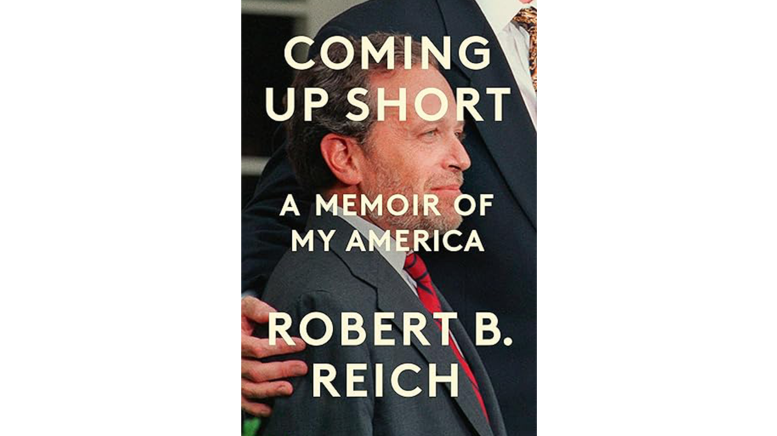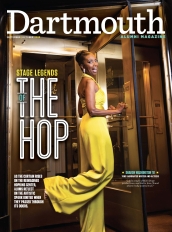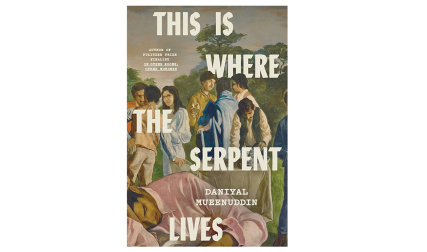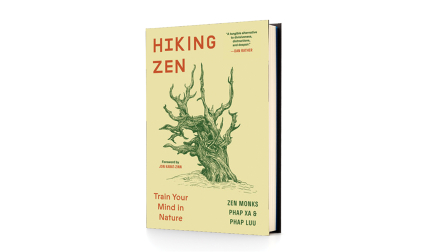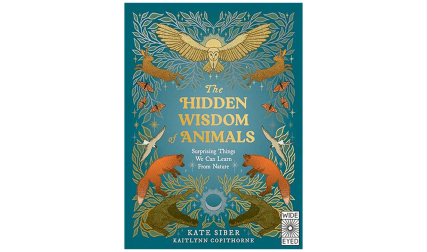ROBERT B. REICH ’68
Coming Up Short: A Memoir of My America
Knopf
In his galvanizing new memoir with its drolly self-deprecating title, the former U.S. labor secretary says he regards “the central struggle of civilization as fighting bullies—standing up against brutality.” At 4-foot-11, Reich grew up having to withstand tormentors and made a lifelong practice of standing up for others and championing fairness rather than revenge. He details how his baby-boom generation has fallen short in many ways, leading to increasing inequality that fuels anger and hatred. Ultimately hopeful, he cautions Americans not to succumb to complacency and assume that everything will work out in the long run.
WILLIAM MORGAN ’66
Academia: Collegiate Gothic Architecture in the United States
Abbeville Press
The author, an architectural historian who has taught at Princeton, the University of Louisville, and Brown, celebrates the collegiate Gothic architectural style that proliferated in American universities and prep schools during the late 19th and early 20th centuries. Unlike the predominately Georgian architecture of Dartmouth, Morgan says collegiate Gothic style—with spires influenced by the Middle Ages—evokes not only America’s Gilded Age of wealth and patronage but dates its roots to the iconic medieval essence of England’s educational institutions, including Magdalen Tower at Oxford and King’s College Chapel at Cambridge.
WILLIAM C. KIRBY ’72
Empires of Ideas: Creating the Modern University from Germany to America to China
Belknap Press (Harvard University Press)
Kirby, a professor of China studies at Harvard, contends that America’s supremacy in higher education is under great stress, particularly at public institutions, while Chinese universities are on the ascent. His book, which reaches back two centuries, examines how certain leading universities rose to prominence and the threats they currently face.
GINA BARRECA ’79
Gina School
Woodhall Press
A Psychology Today blogger and University of Connecticut professor, Barreca and her writing have been called “hilarious and humane” and “wicked, witty, and wonderful.” In Gina School, her 10th book, she offers a delightfully entertaining and thought-provoking collection of 103 bits of advice and pointed observations on everything from grievances and women’s tears to platform sandals, chaos, and giving oneself credit. With clever illustrations by John Guillemette
POLLY MERRITT INGRAHAM ’79
Unconverted: Memoir of a Marriage
Rootstock Publishing
In this tender and exuberant look at her marriage—she an extroverted agnostic, her husband a clergyman who rises through the ranks to become an Episcopal bishop—Ingraham delves into the challenges they have faced through three decades of marriage. She remained true to herself while gaining a deeper understanding of herself, her husband, and marriage.
BLAKE KERR ’80
The Angry Skies: A Physician’s Journey into Cambodia’s Heart of Darkness
East End Press
Kerr, a doctor who spent 13 years documenting China’s brutal military occupation of Tibet, headed to Cambodia in 2000 to see how people were faring since Pol Pot’s communist revolution from 1975 to 1979 left 2 million dead. He unexpectedly met the gang of Khmer Rouge soldiers that had killed three Western backpackers in 1994, then started a clinic with their surgeon, whose uncle killed Pol Pot in 1998. Kerr details his encounters with Khmer Rouge child soldiers, physicians, warlords, and generals as well as Pol Pot’s family and inner circle and how hatred for U.S. bombings helped them raise the troops to defeat the U.S.-backed government and fueled a massive genocide of their people.
VICTORIA REDEL ’80
I Am You: A Novel
SJP Lit (Zando)
Set in the 17th century in Amsterdam’s Golden Age, a time when few women worked as professional artists, this absorbing historical fiction reimagines the lives of skilled still-life painter Maria van Oosterwijck and her maid and assistant Gerta Pieters, who disguised herself as a boy so she could work. The author, a creative writing professor at Sarah Lawrence College, has Gerta recount the entanglement of the women’s secret love story and their rivalry as artists.
KEN MILLER ’84
Becoming Ken: One Black Man’s Journey from Ivy League to Prison and Back Again
Thought Leaders Press
In this moving memoir, the author, now a resilience coach to nonprofits and tribal organizations among others, bares his soul. He frankly describes his struggles with addiction and homelessness and how guiding others became the means of turning around his own life.
KEVIN CURNIN ’86
The More We Take
Booklocker.com
In this blend of historical fiction and magical realism, three Nebraskans try to make sense of how law, religion, and technology fueled the near extermination of the Plains tribes in the 19th century and how Big Ag’s extraction of water from a sacred aquifer threatens ecological desecration today. They are overmatched until they get help from a “Sky Council” of legendary Lakota chiefs and other historical figures. The author contends that fiction gives people a chance to understand today’s issues of climate, law, power, and Indigenous rights in a new light.
NICOLE DOYLEY ’88
What About the Children?: 5 Values for Multiracial Families
Westminster John Knox Press
While multiracial identity brings both gifts and challenges—for kids and parents—those children might wonder how they fit in. The author, who worked in church ministry for nearly 25 years, draws on her experience growing up biracial without much guidance to navigate two worlds. She provides advice and tools to families formed by interracial marriage or transracial adoption to help children embrace, celebrate, and confidently navigate all parts of their heritage.
GUSTAVE PEEBLES ’93
The First and Last Bank: Climate Change, Currency, and a New Carbon Commons
The MIT Press
Peebles, a professor of anthropology at Stockholm University whose research focuses on monetary policy, proposes that atmospheric carbon could be harnessed as a new form of currency—in much the way objects ranging from tobacco leaves and salt to gold and collaterized debt obligations have been used as currency. He argues the provocative idea would also help deal with the climate crisis.
ALIZA PRESSMAN ’96
The 5 Principles of Parenting: Your Essential Guide to Raising Good Humans
Simon & Schuster/Simon Element
In her New York Times bestseller, the author—a developmental psychologist, cofounding director of the Mount Sinai Parenting Center, and mother of two teens—delves into five principles aimed at raising confident, independent kids: relationship, reflection, regulation, rules, and repair. She also urges parents to embrace imperfection and the often-bumpy road to personal growth.
BILLY WYNNE ’99
The Empty Path: Finding Fulfillment Through the Radical Art of Lessening
New World Library
In this how-to manual on cultivating the Buddhist principle of emptiness to declutter the mind as an antidote to our culture’s relentless quest for accumulation and achievement, Wynne presents “the art of lessening” as the path to satisfaction. He proposes accessible practices to appreciate the beauty in each moment and replace anxiety with clarity, ease, and joy.
RAM MURALI ’99
Death in the Air
Harper
This old-fashioned murder mystery is set in the stratosphere of the international idle rich. The Guardian calls it “a White Lotus/Agatha Christie-style ‘closed world’ mystery mashup … certainly a page-turner: smart, funny, and compelling.” Vogue raves that it is “a frothy, fun, truly escapist read—offering perspective on a certain echelon that feels both hyperbolic and cuttingly real at the same time.”
MARA CASEY TIEKEN ’01
Educated Out: How Rural Students Navigate Elite Colleges—And What it Costs Them
University of Chicago Press
Through the stories of nine rural, first-generation students and their families, the author, an associate professor of education at Bates College, shows how geography shapes college opportunities from admission to postgraduation options. She discovered resources such as spring break trips, job networks, and internships are less readily available to first-gen students. Once they graduate and face a job market where the best opportunities are in urban centers, these young adults begin to feel “educated out”—at a cost to rural communities that lose young people with talent and skills.
MARCUS ALEXANDER GADSON ’10
Sedition: How America’s Constitutional Order Emerged from Violent Crisis
New York University Press
The author, a law professor, observes that many citizens believe the violent attack on the nation’s Capitol on January 6, 2021, was unprecedented. He takes readers through six historic instances of constitutional crisis at the state level and urges Americans today to pay increased attention to the risk of constitutional instability in their home states. He reminds readers that constitutional order can fail and democratic collapse is possible and offers advice on how to bolster the constitutional system.
ELIANA RAMAGE ’13
To the Moon and Back
Avid Reader Press/Simon & Schuster
This debut novel about a young woman’s obsessive quest to be the first Cherokee astronaut spans three decades and several continents. It delves into how Steph Harper’s ambitions stretch the limits of her bonds with the people closest to her—her sister, college girlfriend, mother, and niece—and alter their fates as she betrays their love and generosity.
